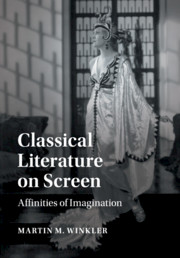
- Cited by 6
-
Cited byCrossref Citations
This Book has been cited by the following publications. This list is generated based on data provided by Crossref.
Bakogianni, Anastasia and Apostol, Ricardo 2018. Locating Classical Receptions on Screen. p. 1.
James, Paula 2018. Locating Classical Receptions on Screen. p. 69.
2018. Books Received. The Classical Review, Vol. 68, Issue. 1, p. 293.
Pache, Corinne Ondine Dué, Casey Lupack, Susan and Lamberton, Robert 2020. The Cambridge Guide to Homer.
Winkler, Martin M. 2020. Ovid on Screen.
Giannopoulou, Zina 2020. Framing Lars von Trier’s Medea. Classical Receptions Journal, Vol. 12, Issue. 3, p. 375.
- Publisher:
- Cambridge University Press
- Online publication date:
- September 2017
- Print publication year:
- 2017
- Online ISBN:
- 9781108123358




